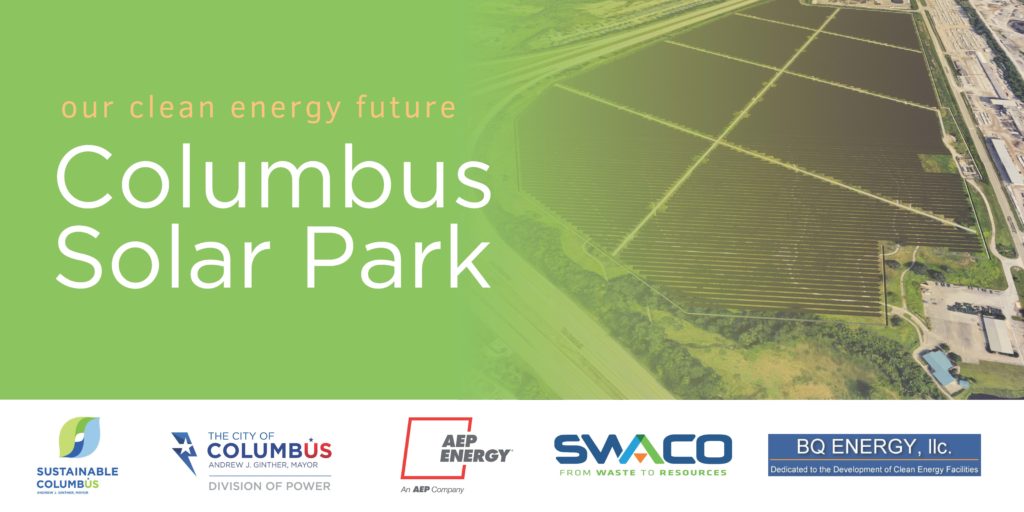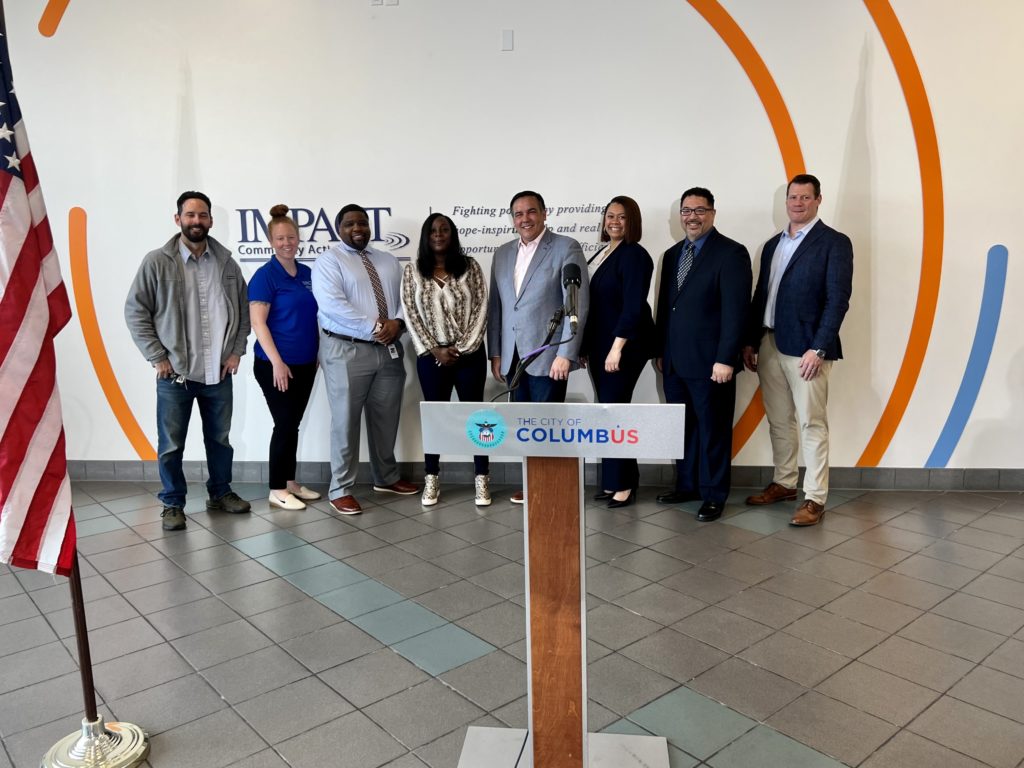Local Government:
City of Columbus, OhioProgram:
Clean Energy ColumbusCategory:
Aggregation, Off-Site Physical PPAProgram Purpose
Clean Energy Columbus, a community choice aggregation program approved by voters in 2020, enables the City of Columbus to contract for energy on behalf of residents and small businesses and provide 100% clean renewable energy through 700 MW of new solar and wind generation installations in Ohio.
Program Overview
In February 2020, City of Columbus Mayor Andrew J. Ginther announced the City’s commitment to pursue a 100% clean energy community choice aggregation (CCA) program to support local clean energy generation, create jobs, and help transition Columbus to a more sustainable economy.
There were multiple steps the City took to create a CCA, foremost being the need to acquire voter approval to implement a clean-energy-based CCA program. Beginning in July 2020, the City started holding virtual public hearings and presenting at neighborhood meetings to educate the community about CCAs and gather feedback.
“Community choice aggregation and a commitment to 100% clean, renewable energy will transform our energy future and are key components to helping us achieve environmental justice and equity, so that all residents in central Ohio are protected from the impacts of climate change.”
City of Columbus Mayor Andrew J. Ginther
In parallel to garnering community support and understanding, the City was also taking steps to ensure its readiness to move the program forward if it received voter approval. A CCA consultant, Trebel Energy, was hired in May 2020. In June 2020, the City launched a competitive bid process to identify a preferred supplier for the CCA, and the selection of AEP Energy was announced in August 2020. This demonstrated the City’s commitment to 100% Ohio-based clean energy and how it was possible to get there. In addition, starting in September 2020, an advisory group was convened to collect stakeholder feedback on the program throughout its design and development up until its ultimate launch.
In November 2020, the ballot question to create a CCA passed with 76% approval. Following approval, the City, Trebel Energy, and AEP Energy got to work on creating the Clean Energy Columbus (CEC) program and getting approval from the Public Utilities Commission of Ohio. Once fully implemented, CEC will be the largest electric aggregation in Ohio and one of the largest in the United States.

Columbus residents were given a choice to participate in the CEC program. Residents who do not want to participate are able to opt out. Those who did not opt out — about 80% of eligible residents and small businesses — started receiving 100% clean energy in June 2021 via a transitionary phase sourcing renewable energy certificates (RECs). This system will be in place until the 700 MW of Ohio wind and solar assets are constructed and operational. An example of one of these projects is a 50 MW solar farm being built on a closed landfill near Grove City, Ohio, which will be putting a brownfield property back into productive use as part of a growing trend of putting solar on closed landfills. Energy from individual components will start feeding into the power grid as they are completed.
By providing Ohio-based clean energy through the construction and maintenance of new wind and solar assets, the program will support nearly 4,500 jobs in Ohio. Additionally, the CEC program is helping the City reinvest in communities impacted most by climate change through a community grant included in the program rate. The City has leveraged those funds to invest in a BIPOC-focused, youth-oriented clean energy jobs program and in low-income residential energy efficiency efforts to reduce energy burden.
How is the program structured?
Resident participation in the CEC program is voluntary, and they can opt out at any time with no fees or penalties. CEC program participants still receive one bill for transmission, distribution, and generation from AEP Ohio. The CEC program covers the generation portion of the bill, and the 100% clean energy is supplied by AEP Energy. The City of Columbus and Trebel Energy work directly with AEP Energy as a team to manage the program.
“Electric aggregation is essentially collective bargaining for energy purchasing. Using this power we have a huge opportunity to provide competitive electricity rates, move towards 100% renewable energy sources and help support clean energy jobs in our region.”
Columbus City Councilmember Rob Dorans
What were Columbus’s biggest challenges in setting up this program?
Educating community members about aggregation: One of the biggest challenges was around communications and messaging, and how to impart understanding of the aggregation process and its clean energy and climate benefits potential. Whether residents or organizational stakeholders, many people don’t understand how energy works or the various components that are reflected on an energy bill. Providing basic information and education on this, the aggregation process, and the climate benefits to impart understanding can be challenging as these are complex topics that needs to be distilled to be as simple as posemsible to communicate. This was particularly important given that the CCA was an opt-out aggregation program put to votes through a ballot initiative.
Aligning Partners: Establishing a clean-energy-focused aggregation program requires working with a variety of partners, organizations, and residents who may have different priorities. While this can be a challenge, the City of Columbus has a rich history of working collaboratively across sectors to achieve success.
What advice would Columbus give other local governments as they pursue climate action projects?
Set clear, bold goals: Having a clear, bold, time-bound goal for a 100% clean energy aggregation program by 2022 was critical to bringing all partners to the table, aligning everyone, and creating excitement and enthusiasm from residents and stakeholders.
Transparency and engagement are key: Throughout the process, the City engaged with communities by sharing information, providing updates, and getting advisory group reaction and feedback. Every step and decision the City made was publicly available and clearly outlined. Transparency, information sharing, and imparting understanding is particularly important to build trust with residents.
How does this project fit into Columbus’s broader climate and community goals?

The CEC program is helping the City of Columbus address its equity, climate, renewable energy, and public health goals.
In February 2020, Mayor Ginther announced a bold and ambitious goal for the Columbus community to be carbon neutral by 2050 while ensuring equity and environmental justice. Through its Sustainable Columbus initiative, the City then worked with community stakeholders and the public to create the Columbus Climate Action Plan, completed in December 2021, outlining strategies and actions for how that goal will be achieved.
The CEC program significantly advances the City toward meeting its various goals. For example, a swift shift to 100% clean electricity for 200,000 customers will reduce emissions by 1.2 million metric tons. This will provide significant health benefits — 700 MW of renewable energy displacing fossil fuel generation could result in $210 million of avoided healthcare costs in Ohio over 20 years, and lead to fewer cases of breathing illnesses and fewer school days or workdays missed. Moreover, aggregation will support clean energy job creation by creating or inducing nearly 4,500 jobs through the construction and maintenance of new wind and solar.
The program also provides significant equity and environmental justice benefits, not only through emissions reductions and improved health, but also by reinvesting community grant funds into communities most vulnerable to climate change. The City just recently announced $1.5 million to launch the Empowered! program, a new clean energy jobs program for Columbus residents aged 18–24, targeting BIPOC communities, as well as nearly $1.2 million to expand weatherization programming and energy efficient appliance upgrades for low-income residents.
Additional Information and Resources
- Mayor Andrew Ginther’s 2020 State of the City Address (City of Columbus Mayor address)
- Mayor Ginther, City and Partners Kick-Off Community Choice Aggregation (City of Columbus press release)
- Columbus Residents to Begin Receiving 100% Clean Energy in June (City of Columbus press release)
- Mayor Ginther and Community Partners Announce Details for New Solar Park (City of Columbus press release)
- Sustainable Columbus (City of Columbus initiative)
- Columbus Climate Action Plan (City of Columbus plan)
- Aggregation Advisory Group Info (City of Columbus CEC page)
- Clean Energy Columbus (City of Columbus CEC program)
- Columbus Voters to Decide Green-Energy Aggregation Plan (Columbus Dispatch news article)
- City Leaders Announce New Program to Boost Hiring in the Clean-Energy Sector (WBNS news article and clip)
- Columbus’ Clean Energy Revolution Is Underway (NRDC article)
- Community Choice Aggregation (Wikipedia article)
- Turning Trash into Treasure (RMI article about landfill solar)
- The Future of Landfills is Bright (RMI report about landfill solar)
This project was included on the Renewables Accelerator’s list: 10 of the Most Noteworthy Local Government Renewables Deals of 2021.
